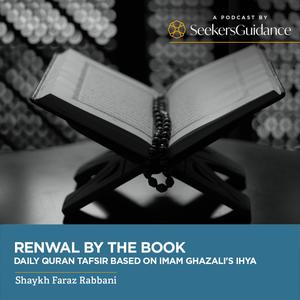
Renewal By The Book: Quran Tafsir Based on Imam Ghazali's Ihya
SeekersGuidance.org
SeekersGuidance Podcast - Islam, Islamic Knowledge, Quran, and the guidance of the Prophet Muhammad
- 35 minutes 43 seconds24-Reflection & the End of Life – Renewal by the Book: Quran Tafsir Based on Imam Ghazali’s Ihya – Shaykh Faraz Rabbani
In this lesson of Renewal by the Book, Shaykh Faraz Rabbani, reflects upon verses of the Quran that correspond to the chapter on reflection and the end of life from Imam Ghazali’s Ihya.
إِنَّمَا مَثَلُ الْحَيَاةِ الدُّنْيَا كَمَاءٍ أَنزَلْنَاهُ مِنَ السَّمَاءِ فَاخْتَلَطَ بِهِ نَبَاتُ الْأَرْضِ مِمَّا يَأْكُلُ النَّاسُ وَالْأَنْعَامُ حَتَّىٰ إِذَا أَخَذَتِ الْأَرْضُ زُخْرُفَهَا وَازَّيَّنَتْ وَظَنَّ أَهْلُهَا أَنَّهُمْ قَادِرُونَ عَلَيْهَا أَتَاهَا أَمْرُنَا لَيْلًا أَوْ نَهَارًا فَجَعَلْنَاهَا حَصِيدًا كَأَن لَّمْ تَغْنَ بِالْأَمْسِ ۚ كَذَٰلِكَ نُفَصِّلُ الْآيَاتِ لِقَوْمٍ يَتَفَكَّرُونَ وَاللَّهُ يَدْعُو إِلَىٰ دَارِ السَّلَامِ وَيَهْدِي مَن يَشَاءُ إِلَىٰ صِرَاطٍ مُّسْتَقِيمٍ
The example of [this] worldly life is but like rain which We have sent down from the sky that the plants of the earth absorb – [those] from which men and livestock eat – until, when the earth has taken on its adornment and is beautified and its people suppose that they have capability over it, there comes to it Our command by night or by day, and We make it as a harvest, as if it had not flourished yesterday. Thus do We explain in detail the signs for a people who give thought. And Allah invites to the Home of Peace and guides whom He wills to a straight path [Quran, 5:24-25]
This verse is directed to those who seek the world and contentment in its pleasures, warning that whenever you seek contentment in this life it will disappoint you. Conversely, Allah invites all of us to the place that will never perish or disappoint us and that is the Home of Peace. To respond to Allah’s invitation one needs to follow the straight path. The Prophet, peace be upon him, invited us to think abundantly about the hereafter and reflect upon death. The reflection upon death should lead one to understand the importance of working towards it and remaining steadfast on the straight path.
Shaykh Faraz advises that people read the translation of the final book of the Ihya which was beautifully translated by Shaykh Abdel Hakim Murad. In this series, Shaykh Faraz, and the other scholars and teachers will be looking at points of reflection from key verses in the Quran. The series will follow the thematic order of Imam Ghazali’s Ihya Ulum al-Din (Renewing the Religious Sciences). The aim is to connect the key verses of guidance from the Book of Allah with the blueprint of renewal, the Ihya so that we experience a renewal by The Book.
For more SeekersGuidance podcast shows, visit seekersguidance.org/podcasts
Help SeekersGuidance reach millions around the world through reliable knowledge and guidance from qualified scholars, completely free: become a monthly supporter – www.seekersguidance.org/donate
The post 24-Reflection & the End of Life – Renewal by the Book: Quran Tafsir Based on Imam Ghazali’s Ihya – Shaykh Faraz Rabbani appeared first on SeekersGuidance.
16 May 2020, 12:56 pm - 30 minutes 52 seconds23- Love of Allah and Sincerity- Renewal by the Book- Shaykh Faraz Rabbani
In this re-broadcast lesson of Renewal by the Book, Shaykh Faraz reviews verses from the Quran that correspond with the chapters on the love of Allah and sincerity in Imam Ghazali’s Ihya. يَا أَيُّهَا الَّذِينَ آمَنُوا مَن يَرْتَدَّ مِنكُمْ عَن دِينِهِ فَسَوْفَ يَأْتِي اللَّهُ بِقَوْمٍ يُحِبُّهُمْ وَيُحِبُّونَهُ أَذِلَّةٍ عَلَى الْمُؤْمِنِينَ أَعِزَّةٍ عَلَى الْكَافِرِينَ يُجَاهِدُونَ فِي سَبِيلِ اللَّهِ وَلَا يَخَافُونَ لَوْمَةَ لَائِمٍ ۚ ذَٰلِكَ فَضْلُ اللَّهِ يُؤْتِيهِ مَن يَشَاءُ ۚ وَاللَّهُ وَاسِعٌ عَلِيمٌ O you who have believed, whoever of you should revert from his religion – Allah will bring forth [in place of them] a people He will love and who will love Him [who are] humble toward the believers, powerful against the disbelievers; they strive in the cause of Allah and do not fear the blame of a critic. That is the favor of Allah; He bestows it upon whom He wills. And Allah is all-Encompassing and Knowing. [Quran 5:54] Shaykh Faraz comments on this verse saying, the major cause of people turning away from Allah is lack of love. That is why the love of Allah is central and important to our faith. Allah’s love is a subset of His mercy. Those whom Allah loves He chooses good for and grants honor and closeness to Him. The Prophet, peace be upon him, tells us that a person will be with whom they love on the day of judgment. Conversely, for one to love Allah that entails that Allah’s love for us precedes it. That is why we must always ask Allah for His love.
Lastly, Shaykh Faraz delves into the chapter on sincerity and explains the levels of sincerity that Imam Ghazali had described in the Ihya. Shaykh Faraz advises that one should begin by striving and that entails choosing what Allah chooses and what is pleasing to Him.
In this series, Shaykh Faraz, and the other scholars and teachers will be looking at points of reflection from key verses in the Quran. The series will follow the thematic order of Imam Ghazali’s Ihya Ulum al-Din (Renewing the Religious Sciences). The aim is to connect the key verses of guidance from the Book of Allah with the blueprint of renewal, the Ihya, so that we experience a renewal by The Book.
For more SeekersGuidance podcast shows, visit seekersguidance.org/podcasts
Help SeekersGuidance reach millions around the world through reliable knowledge and guidance from qualified scholars, completely free: become a monthly supporter – www.seekersguidance.org/donate
The post 23- Love of Allah and Sincerity- Renewal by the Book- Shaykh Faraz Rabbani appeared first on SeekersGuidance.
15 May 2020, 5:40 pm - 26 minutes 59 seconds22- Divine Oneness, Hope & Fear- Renewal by the Book- Shaykh Faraz Rabbani
In this re-broadcast lesson of Renewal by the Book, Shaykh Faraz reviews verses from the Quran that correspond with the chapters on Divine Oneness, hope, and fear in Imam Ghazali’s Ihya. There are verses that focus on hope and others on fear in the Quran and both are equally important to consider. The companions used to discuss the most hope inducing verses in the Quran and the most fear-inducing verses in the Quran, so will this lesson. From each one can derive what this expresses about the Oneness of Allah and our relationship with him. قُلْ يَا عِبَادِيَ الَّذِينَ أَسْرَفُوا عَلَىٰ أَنفُسِهِمْ لَا تَقْنَطُوا مِن رَّحْمَةِ اللَّهِ ۚ إِنَّ اللَّهَ يَغْفِرُ الذُّنُوبَ جَمِيعًا ۚ إِنَّهُ هُوَ الْغَفُورُ الرَّحِيمُ Say, “O My servants who have transgressed against themselves [by sinning], do not despair of the mercy of Allah. Indeed, Allah forgives all sins.
Indeed, it is He who is the Forgiving, the Merciful.” [Quran, 39: 53] In this verse Allah guarantees that He forgives all sins if one repents from them, and even if one does not repent then the matter is to Allah’s will to forgive the person even if they haven’t repented. As such, there is none that is as forgiving as Allah, He is the Most Merciful. وَلَسَوْفَ يُعْطِيكَ رَبُّكَ فَتَرْضَىٰ And your Lord is going to give you, and you will be satisfied. [Quran, 93:5] In this verse, Allah tells us that our hope should be placed in the Hereafter and not in this life. This life is meant to be testing, but the greatest reward will be given in the Hereafter. In this verse the term Rabb is used to denote that Allah is the One who cares for us, continually, towards our ultimate good; the only condition for this is for us to accept the way of the Prophet, peace be upon him. Verses of Fear: وَاتَّقُوا النَّارَ الَّتِي أُعِدَّتْ لِلْكَافِرِينَ And fear the Fire, which has been prepared for the disbelievers. [Quran, 3:131].
We fear Allah because we know Him because just as He is Merciful He is Majestic and All-Powerful. Thus one needs to be cognisant of the station of our Lord. One should understand the verses of the Quran personally, so when it talks to the disbelievers or the Pharaoh one should not take that to mean people other than themselves, it can apply to you as well. وَقَدِمْنَا إِلَىٰ مَا عَمِلُوا مِنْ عَمَلٍ فَجَعَلْنَاهُ هَبَاءً مَّنثُورًا And We will regard what they have done of deeds and make them as dust dispersed. [Quran, 25:23] This verse reminds us to not just assume that our actions will be accepted because acceptance is dependent on our sincerity.
Shaykh Faraz explains that actions are but an empty shell whose life-giving reality is sincerity. In sum, Shaykh Faraz concludes that this all returns to knowing Allah and the ultimate testament of faith is to know that there is no God and no one that we are in need of except Allah. Then one should live by the Prophetic Sunnah through their belief and action that emulates the Prophet, peace be upon him.
In this series, Shaykh Faraz, and the other scholars and teachers will be looking at points of reflection from key verses in the Quran. The series will follow the thematic order of Imam Ghazali’s Ihya Ulum al-Din (Renewing the Religious Sciences). The aim is to connect the key verses of guidance from the Book of Allah with the blueprint of renewal, the Ihya so that we experience a renewal by The Book.
For more SeekersGuidance podcast shows, visit seekersguidance.org/podcasts
Help SeekersGuidance reach millions around the world through reliable knowledge and guidance from qualified scholars, completely free: become a monthly supporter – www.seekersguidance.org/donate
The post 22- Divine Oneness, Hope & Fear- Renewal by the Book- Shaykh Faraz Rabbani appeared first on SeekersGuidance.
14 May 2020, 5:54 pm - 24 minutes 59 seconds21- Repentance, Patience, & Gratitude- Renewal by the Book- Shaykh Faraz Rabbani
In this lesson, Shaykh Faraz continues the series Renewal by the Book giving an overview of the chapter on repentance, patience, and gratitude from Imam Ghazali’s along with a tafsir of the verses of the Quran that correspond to it. In this lesson, Shaykh Faraz looks at verse 13 from chapter 34 in the Quran.
Often times these three qualities: repentance, patience, and gratitude are thought of to be enacted at specific times, like repenting when one does something wrong. However, one should be in all three states at all times and shouldn’t tie them to life events. اعْمَلُوا آلَ دَاوُودَ شُكْرًا ۚ وَقَلِيلٌ مِّنْ عِبَادِيَ الشَّكُورُ “Work, O family of David, in gratitude.” And few of My servants are grateful. [Quran, 34:13] All the Prophets came with one call, that to Allah, and all the virtues of that call are shared, thus the call to Prophet David extends to us as well.
Imam Ghazali explains that Gratitude has three integrals: to recognize the blessing as being from Allah, appreciating the blessing, and then expressing appreciation to Allah. Gratitude is for the servant to direct every blessing that Allah has blessed them with towards what Allah has created it for.
Gratitude entails repentance because whatever you have was given by Allah without you deserving it; then even when one does well because Allah will always deserve better. This also entails patience, because one needs to be patient on the way of Allah. To summarize, gratitude entails: [1] leaving sin, through repentance [2] remaining firm on what is pleasing to Allah through patience The truly grateful express their gratitude for what was prevented from them and not just what is given to them. For this reason, the scholars have listed three levels of gratitude: [1] General gratitude for blessings [2] High gratitude for blessings and tribulations [3] To disappear from the blessings to the bestower of blessings.
Shaykh Faraz concludes by reminding us that true gratitude is directing every blessing whether a blessing or displeasing to Allah with constant repentance because we recognize that Allah deserves better. Lastly, have every renewed patience and commitment to remain firm on all that is pleasing to Allah.
In this series, Shaykh Faraz, and the other scholars and teachers will be looking at points of reflection from key verses in the Quran. The series will follow the thematic order of Imam Ghazali’s Ihya Ulum al-Din (Renewing the Religious Sciences). The aim is to connect the key verses of guidance from the Book of Allah with the blueprint of renewal, the Ihya, so that we experience a renewal by The Book.
For more SeekersGuidance podcast shows, visit seekersguidance.org/podcasts
Help SeekersGuidance reach millions around the world through reliable knowledge and guidance from qualified scholars, completely free: become a monthly supporter – www.seekersguidance.org/donate
The post 21- Repentance, Patience, & Gratitude- Renewal by the Book- Shaykh Faraz Rabbani appeared first on SeekersGuidance.
13 May 2020, 11:52 am - 24 minutes 16 seconds20- Condemnation of Dunya – Renewal by the Book: Quran Tafsir Based on Imam Ghazali’s Ihya – Shaykh Walead Mosaad
In this lesson, visiting scholar, Shaykh Walead Mosaad, gives an overview of select verses from the Quran that correspond with the chapter on the condemnation of the dunya (worldliness) from Imam Ghazali’s Ihya. This chapter is the only chapter in the Ihya where Imam Ghazali says there are too many verses to mention on this subject as if hinting to the fact that most of the Quran point to this theme in general.
The Dunya intended in this chapter is not to condemn one’s living in this world but the Dunya here is in reference to the heart’s love for appetites and desires. Thus the point is to question one’s relationship to the Dunya and be aware that you are in it but not of it. Shaykh Walead explains that this is why at a time of calamity one is enjoined to say we are from God to Him we return as a reminder that this Dunya is not our final abode. As we go along in life Allah sends us reminders of the pershing nature of the Dunya. اعْلَمُوا أَنَّمَا الْحَيَاةُ الدُّنْيَا لَعِبٌ وَلَهْوٌ وَزِينَةٌ وَتَفَاخُرٌ بَيْنَكُمْ وَتَكَاثُرٌ فِي الْأَمْوَالِ وَالْأَوْلَادِ ۖ كَمَثَلِ غَيْثٍ أَعْجَبَ الْكُفَّارَ نَبَاتُهُ ثُمَّ يَهِيجُ فَتَرَاهُ مُصْفَرًّا ثُمَّ يَكُونُ حُطَامًا ۖ وَفِي الْآخِرَةِ عَذَابٌ شَدِيدٌ وَمَغْفِرَةٌ مِّنَ اللَّهِ وَرِضْوَانٌ ۚ وَمَا الْحَيَاةُ الدُّنْيَا إِلَّا مَتَاعُ الْغُرُورِ
Know that the life of this world is but amusement and diversion and adornment and boasting to one another and competition in increase of wealth and children – like the example of a rain whose [resulting] plant growth pleases the tillers; then it dries and you see it turned yellow; then it becomes [scattered] debris. And in the Hereafter is severe punishment and forgiveness from Allah and approval. And what is the worldly life except for the enjoyment of delusion? [Quran, 57:20] The verse begins with an acknowledgment that the world is adorned with various objects that everyone wants to have some possession of that is not shared with others.
Our love for beautiful things is part of our nature, however, we can reorient that love towards the inner beauty of quality as opposed to the outward beauty of material things. The person with the most inner beauty is that of the Prophet, peace be upon him. The parable given in the verse is that of a farmer who is happy with his crops but then it goes away with the change of seasons and then it turns into ash, such is the dunya, it may be pretty now but is inevitably destructed. Shaykh Walead concludes by reminding us that the dunya is all which gets in your way from pursuing the afterlife. The dunya was made for you to take from it what you need to sustain your journey, not to make it the end goal in and of itself.
In this series, Shaykh Faraz and the other scholars and teachers will be looking at points of reflection from key verses in the Quran. The series will follow the thematic order of Imam Ghazali’s Ihya Ulum al-Din (Renewing the Religious Sciences). The aim is to connect the key verses of guidance from the Book of Allah with the blueprint of renewal, the Ihya, so that we experience a renewal by The Book.
For more SeekersGuidance podcast shows, visit seekersguidance.org/podcasts
Help SeekersGuidance reach millions around the world through reliable knowledge and guidance from qualified scholars, completely free: become a monthly supporter – www.seekersguidance.org/donate
The post 20- Condemnation of Dunya – Renewal by the Book: Quran Tafsir Based on Imam Ghazali’s Ihya – Shaykh Walead Mosaad appeared first on SeekersGuidance.
12 May 2020, 5:34 pm - 22 minutes 8 secondsBreaking Desires – Renewal by the Book: Quran Tafsir Based on Imam Ghazali’s Ihya – Ustadh Amjad Tarsin
In this re-broadcast lesson, Ustadh Amjad Tarsin gives an overview of select verses from the Quran that correspond with the chapter on breaking desires from Imam Al-Ghazali’s Ihya. Allah tells us that our salvation is connected to not giving in to one’s lower self and that is why it is crucial for one to control their desires. The lesson will overview the verses 40-41 from Chapter 79 of the Quran. وَأَمَّا مَنْ خَافَ مَقَامَ رَبِّهِ وَنَهَى النَّفْسَ عَنِ الْهَوَىٰ فَإِنَّ الْجَنَّةَ هِيَ الْمَأْوَىٰ But as for he who feared the position of his Lord and prevented the soul from [unlawful] inclination, Then indeed, Paradise will be [his] refuge. [Quran, 79:40-41].
The Prophet, peace be upon him, told us that at the end of time is sanctifying choice and that people should do anything that they wish. However, this goes against the core values of our religion that require one to discipline their desires and whims. The verses show us that our path to paradise is through withholding the things our lower self desires and that will result in the highest level of felicity.
The Prophet told us that the road to paradise is surrounded by things that are not easy or liked by us. It is of the mysteries of our time that we are now told to act upon all of our whims and desires, while every dignified society before us was based on withholding from your desires. However, those who constantly give in to our desires are always miserable. That is why Allah tells us that whoever purifies the self is successful and whoever doesn’t can enter very dark places.
Ustadh Amjad reminds us that we were not created to give in to our whims and that is why doing so makes us miserable. Instead, our freedom from the shackles of servitude to this world is through being a servant only to Allah to attain peace and tranquility. The result of disciplining your desires, is that that which was once bitter and difficult to do becomes sweet and desired by yourself.
Ustadh Amjad concludes by reminding us that our desires don’t always call us to what is in our best interest, that is why even in worldly matters, attaining success always requires sacrifice, such is the case. For pursuing the spiritual path. In addition, remember the reward that awaits those who discipline their desires is felicity, salvation, and paradise. However, remember that none of this is attained overnight, it requires patience, perseverance and continually asking God to allow us to continue down the path.
In this series, Shaykh Faraz, and the other scholars and teachers will be looking at points of reflection from key verses in the Quran. The series will follow the thematic order of Imam Ghazali’s Ihya Ulum al-Din (Renewing the Religious Sciences). The aim is to connect the key verses of guidance from the Book of Allah with the blueprint of renewal, the Ihya, so that we experience a renewal by The Book.
For more SeekersGuidance podcast shows, visit seekersguidance.org/podcasts
Help SeekersGuidance reach millions around the world through reliable knowledge and guidance from qualified scholars, completely free: become a monthly supporter – www.seekersguidance.org/donate
The post Breaking Desires – Renewal by the Book: Quran Tafsir Based on Imam Ghazali’s Ihya – Ustadh Amjad Tarsin appeared first on SeekersGuidance.
11 May 2020, 3:45 pm - 26 minutes 16 seconds18- Understanding the Heart and Disciplining the Self- Renewal by the Book-Shaykh Faraz Rabbani
In this re-broadcast lesson, Shaykh Faraz Rabbani gives an overview of select verses from the Quran that correspond with the chapters on understanding the heart and disciplining the self from Imam Al-Ghazali’s Ihya. This topic is at the heart of our deen and is important to understand.
The lesson will overview the verse 7-10 from Chapter 91 of the Quran. The 91st chapter of the Quran includes the longest chain of oaths, where Allah swears by His signs to emphasize what is being sworn about because it’s real, important, and urgent. In this chapter, the oaths lead up to an oath about the self and how He formed it. وَنَفْسٍ وَمَا سَوَّاهَا فَأَلْهَمَهَا فُجُورَهَا وَتَقْوَاهَا قَدْ أَفْلَحَ مَن زَكَّاهَا وَقَدْ خَابَ مَن دَسَّاهَا And [by] the soul and He who proportioned it; And inspired it [with discernment of] its wickedness and its righteousness; He has succeeded who purifies it, And he has failed who instills it [with corruption]. [Quran, 91: 7-10] Allah swears by the self and how He has formed it. The reason this is in the 3rd person is that it gives greatness to the One saying it.
The marvel of the self here is explained by Allah in the following verses, that it is marvelous because Allah has granted it the inclinations to either be rebellious or righteous; making it a tremendous sign of Allah.
Shaykh Faraz explains that the verses that follow detail the conditions for the Self to attain its felicity and that is through tazkiyyah or purification of the self. Purification of the self is the greatest success that a person can attain and every other success is measured in comparison to it; in so much that it can facilitate the purification of the self. Purification of the self entails the removal of all qualities displeasing to Allah and the acquisition of all qualities pleasing to Allah.
The series will follow the thematic order of Imam Ghazali’s Ihya Ulum al-Din (Renewing the Religious Sciences). The aim is to connect the key verses of guidance from the Book of Allah with the blueprint of renewal, the Ihya, so that we experience a renewal by The Book.
The post 18- Understanding the Heart and Disciplining the Self- Renewal by the Book-Shaykh Faraz Rabbani appeared first on SeekersGuidance.
10 May 2020, 6:21 pm - 24 minutes 53 seconds17- Marriage & Good Character- Renewal by the Book- Shaykh Faraz Rabbani
In this re-broadcast lesson, Shaykh Faraz Rabbani gives an overview of select verses from the Quran that correspond with the chapter on marriage and good character from Imam Al-Ghazali’s Ihya. The two chapters have been enjoined in one lesson because marriage is highly dependent on good character. The lesson will overview the verse 20-21 from Chapter 30 of the Quran on the purposes of marriage. وَمِنْ آيَاتِهِ أَنْ خَلَقَكُم مِّن تُرَابٍ ثُمَّ إِذَا أَنتُم بَشَرٌ تَنتَشِرُونَ وَمِنْ آيَاتِهِ أَنْ خَلَقَ لَكُم مِّنْ أَنفُسِكُمْ أَزْوَاجًا لِّتَسْكُنُوا إِلَيْهَا وَجَعَلَ بَيْنَكُم مَّوَدَّةً وَرَحْمَةً ۚ إِنَّ فِي ذَٰلِكَ لَآيَاتٍ لِّقَوْمٍ يَتَفَكَّرُونَ And of His signs is that He created you from dust; then, suddenly you were human beings dispersing [throughout the earth]. And of His signs is that He created for you from yourselves mates that you may find tranquillity in them; He placed between you affection and mercy. Indeed in that are signs for a people who give thought. [Quran, 3:20-21] Marriage is not just a sign of Allah but it contains within it numerous signs of Allah.
The purpose of marriage is thus is a means to Allah. However, one must be careful because through marriage one can either draw closer to Allah with their spouse or further away by busying themselves with worldly matters that pull them away from Allah. In addition, marriage is a sign of Allah because He places in it the serenity, caring love and mercy that is needed for the marriage to function and are all gifts from Allah.
Shaykh Faraz explains that there is also a general meaning to the verse above, that is not specific to spouses but rather applies to all human relations and that is the mercy and deep care that allows for human interactions to be sustained; this is one of the signs of Allah. The mercy and deep care spoken about in the verse were integral to the Prophetic Character that we are all encouraged to emulate. As such, at the heart of a good marriage and knowing how to interact with others is good character. وَإِنَّكَ لَعَلَىٰ خُلُقٍ عَظِيمٍ “And truly you are upon tremendous character” [Quran, 68:4] One’s character is most manifest in their choices, particularly the difficult ones.
Good character also requires a higher purpose and that is to respond to Allah. In this series, Shaykh Faraz, and the other scholars and teachers will be looking at points of reflection from key verses in the Quran. The series will follow the thematic order of Imam Ghazali’s Ihya Ulum al-Din (Renewing the Religious Sciences). The aim is to connect the key verses of guidance from the Book of Allah with the blueprint of renewal, the Ihya, so that we experience a renewal by The Book.
For more SeekersGuidance podcast shows, visit seekersguidance.org/podcasts
Help SeekersGuidance reach millions around the world through reliable knowledge and guidance from qualified scholars, completely free: become a monthly supporter – www.seekersguidance.org/donate
The post 17- Marriage & Good Character- Renewal by the Book- Shaykh Faraz Rabbani appeared first on SeekersGuidance.
9 May 2020, 7:22 pm - 25 minutes 3 seconds17-Commanding the Good – Renewal by the Book-Quran Tafsir Based on Imam Ghazali’s Ihya – Shaykh Faraz Rabbani
In this re-broadcasted lesson, Shaykh Faraz Rabbani gives an overview of select verses from the Quran that correspond with the chapter on commanding the good from Imam Al-Ghazali’s Ihya. The lesson will overview the verse 104 from Chapter 3 of the Quran that encompasses all that one needs to know about commanding the good. وَلْتَكُن مِّنكُمْ أُمَّةٌ يَدْعُونَ إِلَى الْخَيْرِ وَيَأْمُرُونَ بِالْمَعْرُوفِ وَيَنْهَوْنَ عَنِ الْمُنكَرِ ۚ وَأُولَٰئِكَ هُمُ الْمُفْلِحُونَ And let there be [arising] from you a nation inviting to [all that is] good, enjoining what is right and forbidding what is wrong, and those will be the successful. [Quran, 3:104] These verses explain the common principles that underlie commanding the good for any person. First, it identifies commanding good as a communal obligation that must be undertaken by some from within that community. Second, some from within the community who are able to and have the knowledge should be dedicated to this duty, while others are required to engage in it based on circumstances and if they have the know-how. Thirdly, the basis for calling to good is calling people to that which is known to be virtuous, bringing people closer to all that is good for them. This must come from a place of sincere concern for the person and the community. Fourthly, there is a social responsibility embedded in each person’s personal responsibility to enjoin the good.
Shaykh Faraz reminds us that the religion itself revolves around sincere concern and that entails wanting good for others as you would for want for yourself. That is why a subset of the community is required to enjoin the good and forbid the evil. The way to forbidding evil applies only to matters that are prohibited. Thus one should only command the good when it is required and when one knows that it will bring upon benefit. The way to do so is through having sincere concern, mercy, and being positive in the way you deliver your message throughout. Imam al-Shafi’i advises that giving council should be done in private so as to not humiliate people and is likely to get them to listen more and act upon the council.
Shaykh Faraz concludes with advising those enjoining the good do so with mercy, wisdom, and sincere concern. In this series, Shaykh Faraz, and the other scholars and teachers will be looking at points of reflection from key verses in the Quran. The series will follow the thematic order of Imam Ghazali’s Ihya Ulum al-Din (Renewing the Religious Sciences). The aim is to connect the key verses of guidance from the Book of Allah with the blueprint of renewal, the Ihya, so that we experience a renewal by The Book.
For more SeekersGuidance podcast shows, visit seekersguidance.org/podcasts
Help SeekersGuidance reach millions around the world through reliable knowledge and guidance from qualified scholars, completely free: become a monthly supporter – www.seekersguidance.org/donate
The post 17-Commanding the Good – Renewal by the Book-Quran Tafsir Based on Imam Ghazali’s Ihya – Shaykh Faraz Rabbani appeared first on SeekersGuidance.
8 May 2020, 11:30 am - 24 minutes 18 seconds15-Travel: Purpose, Reflection, Gratitude- Renewal by the Book- Shaykh Faraz Rabbani
In this lesson, Shaykh Faraz Rabbani, gives an overview of select verses from the Quran that correspond with the chapter on travel from Imam Al-Ghazali’s Ihya. This chapter focuses on the purpose of travel, reflection in travel, and gratitude from it. The lesson will overview the verses 12-14 from Chapter 43 of the Quran on the du’a one should recite when traveling. وَالَّذِي خَلَقَ الْأَزْوَاجَ كُلَّهَا وَجَعَلَ لَكُم مِّنَ الْفُلْكِ وَالْأَنْعَامِ مَا تَرْكَبُونَ لِتَسْتَوُوا عَلَىٰ ظُهُورِهِ ثُمَّ تَذْكُرُوا نِعْمَةَ رَبِّكُمْ إِذَا اسْتَوَيْتُمْ عَلَيْهِ وَتَقُولُوا سُبْحَانَ الَّذِي سَخَّرَ لَنَا هَٰذَا وَمَا كُنَّا لَهُ مُقْرِنِينَ وَإِنَّا إِلَىٰ رَبِّنَا لَمُنقَلِبُونَ And who created the species, all of them, and has made for you of ships and animals those which you mount. That you may settle yourselves upon their backs and then remember the favor of your Lord when you have settled upon them and say. “Exalted is He who has subjected this to us, and we could not have [otherwise] subdued it. And indeed we, to our Lord, will [surely] return.” [Quran, 43:12-14] Saying this prayer, even if one may not understand the Arabic phrasing, is of benefit to you.
Because everything in the sunnah we are encouraged to do is of benefit to us both worldly and spiritual. The first verse reminds us of the vehicles that Allah has facilitated for us to put to use. The purpose of the blessing is not to enjoy it but to be grateful for the Bestower. Scholars remind us that there are spiritual benefits to traveling. Planning for travel should not simply be the logistics of travel but the intentions behind traveling. We are reminded of this in the hadith of the Prophet on intentions “migration to Allah and His Prophet”. However, some of the companions had migrated for various reasons and intentions other than that. And the Prophet, peace be upon him, said that their migration was “for whatever they migrated for”. What intentions should one have when traveling? [1] Neediness upon Allah [2] Reliance upon Allah [3] Worship [4] Upholding good character [5] Have good company when traveling [6] Doing good while traveling [7] Calling to Allah [8] Remembrance and devotion.
Shaykh Faraz concludes by reminding us that we should seek to appreciate the blessings of the modes of transportation that we have been provided. We also should appreciate the opportunities for the acts of remembrance that we’ve been provided with at various instances during the day, including during travel.
Lastly, Shaykh Faraz ends with the counsel from Imam ibn al-Banna on purposeful travel. In this series, Shaykh Faraz, and the other scholars and teachers will be looking at points of reflection from key verses in the Quran. The series will follow the thematic order of Imam Ghazali’s Ihya Ulum al-Din (Renewing the Religious Sciences). The aim is to connect the key verses of guidance from the Book of Allah with the blueprint of renewal, the Ihya, so that we experience a renewal by The Book.
For more SeekersGuidance podcast shows, visit seekersguidance.org/podcasts
Help SeekersGuidance reach millions around the world through reliable knowledge and guidance from qualified scholars, completely free: become a monthly supporter – www.seekersguidance.org/donate
The post 15-Travel: Purpose, Reflection, Gratitude- Renewal by the Book- Shaykh Faraz Rabbani appeared first on SeekersGuidance.
7 May 2020, 6:38 pm - 29 minutes 30 seconds14-Seclusion & the Preservation of Faith – Renewal by the Book- Shaykh Faraz Rabbani
In this lesson, Shaykh Faraz Rabbani reviews verses from the Quran that correspond with the chapter on Seclusion and the Preservation of Faith from Imam Ghazali’s Ihya. The verses covered in this lesson are from the 18th chapter of the Quran on the people of the Cave, verses 9-16. The story of the people of the Cave in the Quran focuses on the points of guidance from this story, that’s why the details of their story are not mentioned in the Quran like other Biblical traditions. The reason that reading this Chapter every Friday is to renew one’s faith. That is why the central message of the chapter is the preciousness and preservation of faith. The preservation of one’s faith is done through seclusion or migration. Here, seclusion is not an ends in itself but it is separate one from evil and its people with one’s heart and action even if one is amongst them.
The physical seclusion is to give one the strength for the spiritual seclusion from their actions. أَمْ حَسِبْتَ أَنَّ أَصْحَابَ الْكَهْفِ وَالرَّقِيمِ كَانُوا مِنْ آيَاتِنَا عَجَبًا إِذْ أَوَى الْفِتْيَةُ إِلَى الْكَهْفِ فَقَالُوا رَبَّنَا آتِنَا مِن لَّدُنكَ رَحْمَةً وَهَيِّئْ لَنَا مِنْ أَمْرِنَا رَشَدًا Or have you thought that the companions of the cave and the inscription were, among Our signs, a wonder? [Mention] when the youths retreated to the cave and said, “Our Lord, grant us from Yourself mercy and prepare for us from our affair right guidance.” [Quran, 18:9-10] Here, the verses mention mercy and what is meant by that mercy is faith and guidance.
The story itself showcases the high levels of taqwa that the people of the cave had in their attempts to preserve their faith. As such, one should always strive to preserve what they’ve been blessed with from Allah. هَٰؤُلَاءِ قَوْمُنَا اتَّخَذُوا مِن دُونِهِ آلِهَةً ۖ لَّوْلَا يَأْتُونَ عَلَيْهِم بِسُلْطَانٍ بَيِّنٍ ۖ فَمَنْ أَظْلَمُ مِمَّنِ افْتَرَىٰ عَلَى اللَّهِ كَذِبًا وَإِذِ اعْتَزَلْتُمُوهُمْ وَمَا يَعْبُدُونَ إِلَّا اللَّهَ فَأْوُوا إِلَى الْكَهْفِ يَنشُرْ لَكُمْ رَبُّكُم مِّن رَّحْمَتِهِ وَيُهَيِّئْ لَكُم مِّنْ أَمْرِكُم مِّرْفَقًا These, our people, have taken besides Him deities. Why do they not bring for [worship of] them a clear authority? And who is more unjust than one who invents about Allah a lie?” [The youths said to one another], “And when you have withdrawn from them and that which they worship other than Allah, retreat to the cave. Your Lord will spread out for you of His mercy and will prepare for you from your affair facility.” [Quran, 18:15-16] Verses 15 and 16 show us that one should be vigilant in what they choose to associate with and what they choose to disassociate with. A believer should be clear about what is the truth, right and good, and holds fast to it.
In addition, Shaykh Faraz reminds us that we dislike the action and not the person, and disassociate with the action and not people. Lastly, Shaykh Faraz concludes with a quote from Imam Ibn ‘Ajiba and Imam Ibn ‘Ata’illah that whoever dedicates themselves to Allah, Allah will reward them, protect them, and shields their heart. To do this one should take some time for seclusion to reflect, pray, and remember Allah.
Shaykh Faraz and the other scholars and teachers will be looking at points of reflection from key verses in the Quran. The series will follow the thematic order of Imam Ghazali’s Ihya Ulum al-Din (Renewing the Religious Sciences). The aim is to connect the key verses of guidance from the Book of Allah with the blueprint of renewal, the Ihya so that we experience a renewal by The Book.
The post 14-Seclusion & the Preservation of Faith – Renewal by the Book- Shaykh Faraz Rabbani appeared first on SeekersGuidance.
6 May 2020, 6:02 pm - More Episodes? Get the App
Your feedback is valuable to us. Should you encounter any bugs, glitches, lack of functionality or other problems, please email us on [email protected] or join Moon.FM Telegram Group where you can talk directly to the dev team who are happy to answer any queries.
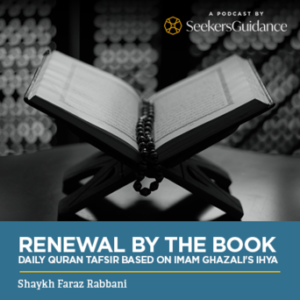
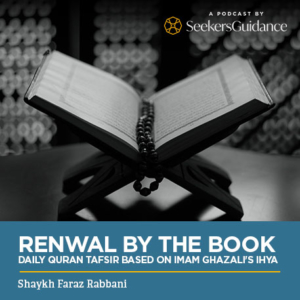
 Islam for Life with Shaykh Walead Mosaad
Islam for Life with Shaykh Walead Mosaad
 Content of Character with Shaykh Yahya Rhodus
Content of Character with Shaykh Yahya Rhodus
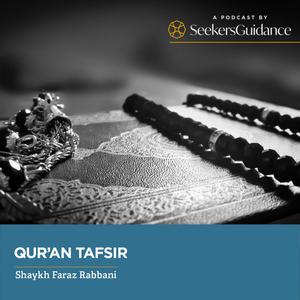 Qur'an Tafsir: Understanding the Word of Allah with Shaykh Faid Mohammed Said
Qur'an Tafsir: Understanding the Word of Allah with Shaykh Faid Mohammed Said
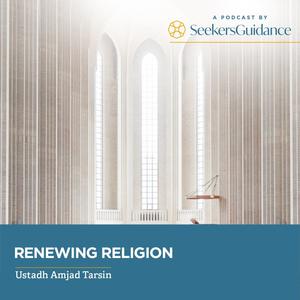 Renewing Religion: An Overview of Ghazali's Ihya
Renewing Religion: An Overview of Ghazali's Ihya
 Simply The Best – SeekersGuidance
Simply The Best – SeekersGuidance